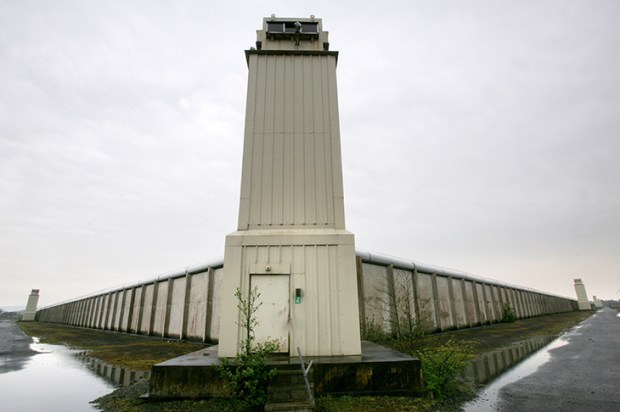You don’t need headphones to appreciate, and catch on to, the unique selling point of radio: its immediacy, its directness, that sense that someone is talking to you, and you alone. In fact, if anything, headphones take away from radio’s ability to reach out to the isolated and the lonely, to create that connection between you, the listener, and that someone else, the person behind the mic. With headphones the voice gets inside your head, but it’s not like having a conversation. That USP also explains why listening in the car works so well, creating a companionship while driving alone along a road empty of human contact, surrounded by fast-moving machines. You need that voice to reassure and remind, keep you focused and aware.
Behind the wheel is also where you’re most likely to experience the serendipity of switching on and hearing something that suddenly speaks directly to you, the words moving beyond just hearing into a much deeper connection, a resonance. The other day, for instance, on a routine run home from the shops, I found myself inside an American prison and listening to the cook who had spent years preparing food for those on death row.
The cook, Brian Price, was talking on Short Cuts, Radio 4’s series of short documentaries that tell a story, take us into another life, curated by Josie Long (and produced by Eleanor McDowall). Price had been assigned to the kitchen on arrival at the Walls Unit prison in Huntsville, Texas, and was taught his craft by a four-star chef. (How, one wondered, had both Price and the chef ended up in prison?) In 1991 Price took over the job of making meals for those about to be executed and did it for the next ten years, preparing 189 last meals.
Prisoners were allowed to ask for anything for their last meal before oblivion, but if lobster was what they wanted it would be replaced by prison-ration breaded pollack, the bread crumbs washed off by Price and a special fresh batter prepared to make it look ‘like something from the free world’. One prisoner, in the handwritten note he had prepared two or three days before, requested a chocolate birthday cake with ‘2:23:90’ on it and seven pink candles, one coconut, kiwi fruit juice, one mango, grapes, lettuce, cottage cheese, peaches, one banana and one delicious apple. It’s the ‘seven pink candles’ and the ‘delicious’ apple that hit home.
Polly Weston’s new series for Radio 4, The Patch, could become one of those long-running favourites, ever-popular because of the way in which seemingly ordinary, almost mundane material is transformed into something with meaning, with connection. We all fantasise about desert islands, the luxury of escape; we’re all drawn to the idea of bringing a group of people back together after a number of years have passed; we all might now, thanks to Weston, discover a fascination with postcodes. Weston has come up with the idea (why has it never been done before?) of randomly picking a postcode and then travelling to that place to see if she can find a story there that needs telling. Her first destination, TQ8, turned out to be Salcombe in Devon, on first sight nothing more than a rather nice holiday destination for those with middle-class means.
Weston turns up in late September when most of the tourists have gone home, exposing the town’s main business other than holiday homes — crabbing. She talks to John who’s had a boat since 1978 and knows well the wild fluctuations in catches. Up at 3.45 in the morning to take the boat out, without knowing whether there will be a decent catch at the end of the day, and a proper living earned by all that labour in dangerous conditions. A hard life and too much for Peter, the hairdresser, who gives up everything to go fishing only to realise he doesn’t like touching fish. Not much of a story, though, says Weston. Until she starts hearing about the recent surges in crab prices and tries to find out why. The answer, she discovers, lies in China. A routine story about life in a village by the sea suddenly turns political, linking Salcombe’s fate closely with Shanghai.
I’ve tended to avoid the Pursuit of Beauty series on Radio 4, put off by the title. But I was intrigued by Saturday’s edition, In Emily Dickinson’s Bedroom (produced by Jessica Treen), always wanting to know more about this writer, ‘one of the pillars of American poetry’, so careful with words, so reticent in person and yet so terrifyingly, dangerously up front on the page. Three writers, Sharon Olds, Cheryl Strayed and Ocean Vuong, were invited to spend an hour in the room where Dickinson spent most of the last 30 years of her life, in the house in Amherst, Massachusetts where she was born and where she died. Would the experience help them to understand Dickinson better? Would it inspire them to write? Or shut down their own inner voice?
This was so well made. Straightforward. Direct. Each voice clearly making its own imprint. Speaking for itself yet also taking us inside Dickinson’s work.
Got something to add? Join the discussion and comment below.
Get 10 issues for just $10
Subscribe to The Spectator Australia today for the next 10 magazine issues, plus full online access, for just $10.
You might disagree with half of it, but you’ll enjoy reading all of it. Try your first month for free, then just $2 a week for the remainder of your first year.





![British poet Salena Godden presenter of Mrs Death Misses Death on Radio 4. [Photo: Roberto Ricciuti / Getty Images]](https://www.spectator.com.au/wp-content/uploads/2018/12/Radio.jpg?w=620)







Comments
Don't miss out
Join the conversation with other Spectator Australia readers. Subscribe to leave a comment.
SUBSCRIBEAlready a subscriber? Log in